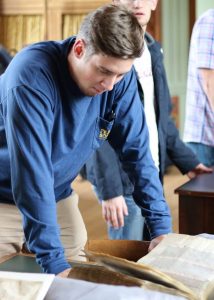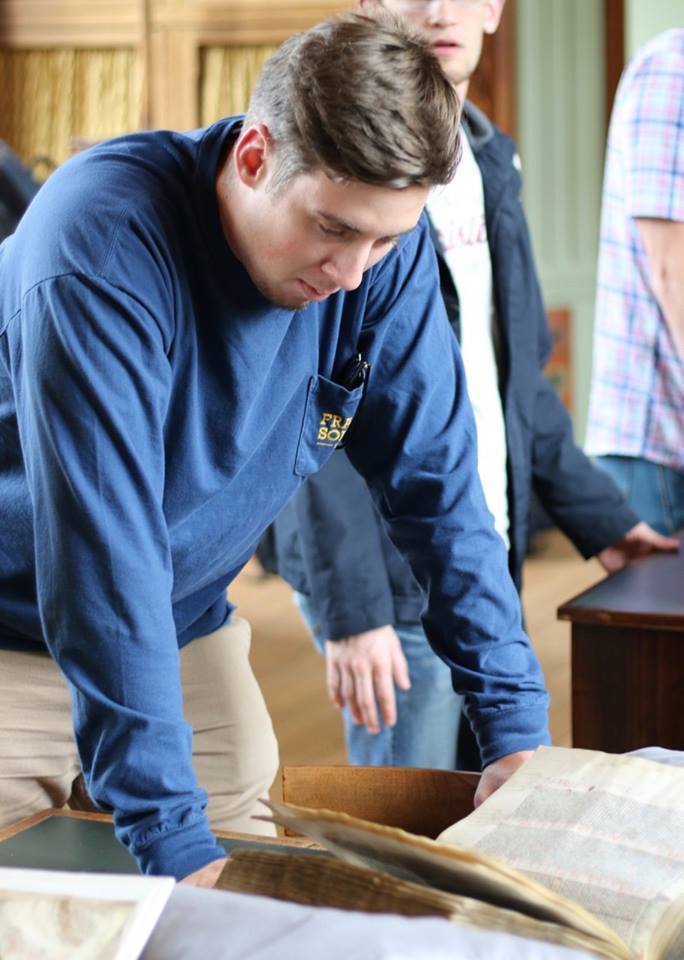Recently I was browsing my TimeHop (which, for those who are blissfully unaware, is a cell phone app that mercilessly displays your unfiltered social media posts from today’s date in years past) when I came across a Tweet from four years ago that read something like this: “Is it weird that I’m actually really excited to learn Greek???” If I could talk to this four-years-in-the-past Ryne, I’d tell him that although it is quite weird for you to have shared such an arbitrary thought with the entire Internet, you will be delighted to know that your desire to learn Greek is not weird at all but will in fact be quite fruitful.
That naïve version of me couldn’t have really understood how rewarding the study of this ancient language would be. Indeed, only now in retrospect am I able to fathom the many doors that were opened to me through my study of Greek (and, eventually, other ancient languages) at ACU.
At the outset of my undergrad time at ACU I had only a vague sense of vocation. Something to do with the Bible, something to do with ministry. I was sure that the arc of my career would involve these two aspects, but I had no clearer direction than that.
The story of how my vocational understanding eventually crystallized is long and multifaceted, but for the purposes of this post, you only need to know the primary catalyst and the new ministerial yearning that it sparked within me. The catalyst was Greek; the yearning was for a ministry conducted not in a church building, but in a classroom.
The long and short of it was that I absolutely loved learning Greek. Before college, I had no particular interest in language learning, but Greek opened my eyes not only to a new skillset that I possessed, but also to new doorways through which to study the biblical text that I held so dear. My first taste of Greek was sort of like a baby’s first bite of chocolate cake at their first birthday party—I wasn’t quite sure what this new thing was, but I was absolutely sure that I wanted more.
Luckily for me, I happened to choose a university with a faculty that was uniquely and diversely equipped to give me more. Languages were a huge part of what brought me to the Graduate School of Theology for my master’s work. I had drank deeply from the well of Greek in undergrad and had dipped my toe in the waters of Hebrew, and the GST offered an opportunity for more of the same as well as an expansion of my linguistic horizons.
In my first year at the GST I got involved with CSART—The Center for the Study of Ancient Religious Texts. I’ve spoken above about the doors that language learning at ACU has opened for me, and this has been one of the biggest. In CSART, students (undergrad and grad) have the opportunity to partner with experts in textual scholarship in the study of primary biblical and early Christian texts. The project that I’m currently on, for example, is working with a seventh century monastic text called The Ladder of Divine Ascent.

Ryne examining books & artifacts at the Matthew Parker Library in Cambridge.
My involvement in this project, as well as in another one during my time in undergrad, opened two very tangible doors for my academic career: two summer trips to a conference in Oxford, England. The Logos Conference is hosted by the Museum of the Bible Scholars Initiative, with which CSART partners in its projects. Because of the generosity of the Green family (the owners of Hobby Lobby, who founded the Museum of the Bible and the Scholars initiative) as well as the work that CSART does, I was able to spend a couple of weeks each of the past two summers in Oxford with other students from all around the world listening to and learning from internationally renowned biblical scholars.
Those experiences in Oxford were especially formative for me, not just because of the academic interest they held for me but for the way they affirmed my sense of vocation. I’ve spent most of this post spotlighting the way language learning at ACU has opened doors for me, but now I want to turn briefly to that ministerial yearning I mentioned before. My affinity for ancient biblically related languages has not only been fruitful in scholarly opportunities, it has also instilled in me a deep appreciation and passion for the importance of these ancient languages in studying the Scriptures.
At those conferences in Oxford I was able to look around and see professional scholars engaged in an academic sort of ministry as well as many students like myself aspiring to do the same. My paradigm for ministry had been shifting and I was beginning to wonder if teaching the Bible and its languages in a higher education context could actually be considered ministry. For my whole life I had thought of ministry as something that was done in either a church building or a mission field, so this idea that it might also be done in a classroom was foreign and frankly a little difficult to wrap my head around. But it was in Oxford that I finally settled into this vision of ministry and fully accepted that my passion for the biblical text and its languages could and should be leveraged into a teaching ministry conducted in the classrooms of a university.
So now as I reflect back on that tweet from four years ago and I think about the excitement that preceded my first day of Greek class, I realize that that enthusiasm was pregnant with something much weightier than academic curiosity. It was dripping with divine purpose, and though I couldn’t see it yet, that purpose would dramatically reorient my world. It would open academic doors that I didn’t know existed, it would deepen my connection with the biblical text that I loved, and it would define the shape of my ministerial vocation.
I had a déjà vu experience a few days ago that helped put this all in perspective for me. As I walked into my last class of the week, I realized that it was next door to an old familiar room. I glanced inside at the handful of youthful faces—a few of which were fresh with the excitement of a new academic challenge. I recognized that look in their eyes. And I recognized the voice of the professor, introducing another batch of students to the wide world of New Testament Greek. I remembered fondly the first time I had sat in that room, excited for the challenge but naïve to the opportunity.
And then I walked through another door. With the voice of my first-year Greek professor still barely audible, I sat down in the midst of that old familiar anticipation. And with thankfulness for the way that spark of intrigue in Greek had been fanned into a full-fledged flame of passion for ancient languages, I pulled out my syllabus for Elementary Syriac. Another new door that will undoubtedly lead to more opportunities—academic, spiritual, and ministerial all.


I also hope that you get to travel to Greece soon.